









|
 KEYNOTE Information
Wednesday 18 April • 8:30 – 10:00
Landsdowne Room |
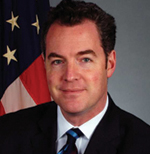 |
John M. R. Kneuer
Assistant Secretary of Commerce for Communications and Information
|
John M. R. Kneuer was nominated by President George W. Bush on May 1, 2006, and confirmed by the U.S. Senate on Dec. 9, 2006, to be Assistant Secretary of Commerce for Communications and Information and Administrator of the National Telecommunications and Information Administration.
As Assistant Secretary of Commerce for Communications and Information, Mr. Kneuer oversees and directs NTIA. NTIA seeks to promote market-based policies which lower prices to consumers and encourage innovation, while harnessing the resources of the federal government to support spectrum-based technologies which enhance efficiency and productivity. In addition to representing the Executive Branch in domestic and international telecommunications and information policy activities, NTIA also manages the federal use of spectrum; performs cutting edge telecommunications research and engineering, including resolving technical telecommunications issues for the federal government and private sector; and administers infrastructure and public telecommunications facilities grants.
Mr. Kneuer joined NTIA in October 2003. Prior to joining NTIA, Mr. Kneuer served as a Senior Associate at the law firm of Piper Rudnick in Washington, D.C., providing regulatory and legislative representation to corporate clients in the telecommunications, defense, and transportation industries.
From 1997-1998, Mr. Kneuer served as the Executive Director for Government Relations at the Industrial Telecommunications Association, and prior to that served as an Attorney-Advisor in the Commercial Wireless Division of the Federal Communications Commission's Wireless Bureau. Mr. Kneuer received B.A. and J.D. degrees from the Catholic University of America. He is a member of the District of Columbia Bar.
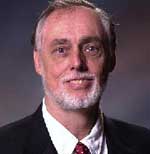 |
Bruce Fette, Ph.D.
Chief Scientist, Information Security Systems
|
Title: Opportunities for Cognitive Radio Applications
Abstract: This talk presents an overview of applications for cognitive radio products ranging from immediate product opportunities to long range developments. This talk will touch on the technical and economic opportunities with focus on immediate and practical applications. The talk completes with a brief survey of Cognitive Radio Technologies published at the SDR Forum over the previous 3 years.
Bruce Fette, Ph.D, is Chief Scientist in the Communications Networking Division business area of General Dynamics C4 Systems in Scottsdale, Ariz. He has been with the business unit for 37 years, working in LSI design, speech signal processing, advanced signal processing for telephony, and RF communications.
He has 36 patents and has been awarded the “Distinguished Innovator Award”. Dr. Fette received his Bachelor of Science in Electrical Engineering from the University of Cincinnati in 1969, his Masters of Science in Electrical Engineering from Arizona State University in 1974 and his Ph.D from ASU in 1981. He has also worked with the Software Defined Radio (SDR) Forum from its inception, currently performing the role of Technical Chair, and is a panelist for the IEEE Conference on Acoustics Speech and Signal Processing Industrial Technology Track.
Dr. Fette currently heads the General Dynamics Signal Processing Center of Excellence in the Communication Networks Division. This division produces the DMR radio, the PRC-112G search and rescue radio, the FAA UHF radio, and many special purpose radios.
| Banquet Speaker |
|
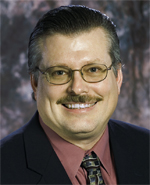 |
Gary Grube
Senior Fellow, Motorola Labs
|
Gary is a Senior Fellow and directs all wireless research at Motorola Labs. Previously he held the Chief Technology Officer position at Motorola's Government and Enterprise Mobility Solutions Business.
Gary joined Motorola in 1980. He has worked in the area of wireless systems development focusing on system architecture, intellectual property rights, and technology planning. Gary is a board member of the Motorola Science Advisory Board, and in1994 he was named a Dan Noble Fellow, Motorola's highest award for technical achievement. Gary holds 107 issued U.S. patents and has many more pending. A frequent public speaker, Gary has been called upon many times by the U.S. Congress to testify as an expert in matters related to homeland security communications.
Gary serves as Vice Chairman of Safe America, a non-profit organization focused on personal safety awareness and training. He co-chairs Operation Safe America which is connecting government and communities on homeland security awareness and preparation. In 2003 Gary was appointed by Mayor Richard M. Daley to serve on the Mayor's Council of Technology Advisors for the City of Chicago promoting high-tech around the Chicagoland area. Gary is also a member of the Executive Advisory Board of the International Engineering Consortium.
Gary earned a Bachelor of Science in Electrical Engineering (BSEE) degree at the University of Illinois, Champaign, a Masters of Science in Electrical Engineering (MSEE) degree from the Illinois Institute of Technology, Chicago, and he also holds an Masters in Business Administration (MBA) earned in the executive program at Northwestern University in Evanston Illinois.
Gary supports the technology side of Motorola's motor sports sponsorships where he oversees the application of our current and emerging products at the track. His personal knowledge and interest in auto racing, combined with his experience in communications technology, helps Motorola leverage the challenging racing environment to test new technologies that can be deployed across other segments. He works directly with organizations like the General Motors LeMans Corvette team and the Andretti-Green IRL Racing Team.
Thursday 19 April • 8:00 – 10:00
Landsdowne Room |
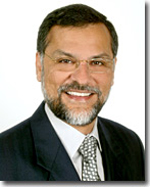 |
Jawad Khaki
Corporate Vice President, Windows Networking & Device Technologies |
In his position as corporate vice president of Windows Networking & Device Technologies at Microsoft Corp., Jawad Khaki is responsible for overseeing the development of those networking technologies in Microsoft Windows platforms. Khaki manages the group of engineers and business leaders dedicated to delivering integrated communication and device technologies that empower information workers and home users.
Since the start of his career at Microsoft in 1989, Khaki has continued to focus his passion on always-available networks for Windows-based devices that empower people with information and make it easy to seamlessly work, play and communicate.
Starting with Windows 95, Khaki spearheaded the addition of dial-up networking, wireless networking and broadband infrastructure. He has since led the initiative to deliver information protocols, application program interfaces and core networking server components such as the Dynamic Host Configuration Protocol (DHCP), RADIUS and virtual private networking (VPN) in the Windows XP and Windows Server 2003 platforms. These technologies provided the foundation for Windows-based wired, wireless and peer-to-peer networking experiences for IT professionals, information workers and home users.
With more than 25 years of hardware and software design experience, as well as more than 700 U.S. patents filed under his management - over 400 in the United States and more than 300 patents in other countries - Khaki brings dedication and excitement to ensuring that Windows-based PCs and devices deliver innovative, relevant and superior experiences. Khaki is responsible for determining the networking and device strategy and advances in Windows Vista, the next generation of the Microsoft Windows operating system.
Trained and educated as a computer engineer in London, Khaki spent his early career as a hardware design engineer developing hardware and firmware for GEC Computers Ltd. in Great Britain, and as a UNIX development consultant for AT & T Bell Laboratories.
Among Khaki's many achievements, he was appointed honorary professor by Beijing University of Post and Telecommunications in October 2003. He also contributes to his local community and was nationally recognized with the sixth annual Walter Cronkite Faith & Freedom Award by the Interfaith Alliance Foundation.
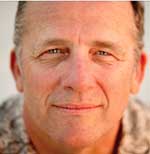 |
Dr. Joseph Mitola III
Consulting Scientist, The MITRE Corporation |
Title: The future of cognitive radio
Dr. Mitola is an internationally recognized expert on software and cognitive radio systems and technologies who addresses critical DoD communications and information processing challenges in MITRE’s Department of Defense (DoD) Federally Funded R&D Center (FFRDC). Between 2002 and 2005, he was on loan to the US DoD to develop trustable cognitive systems with DARPA.
In addition to having published the first paper on software radio architecture in 1991, he has taught short courses on software radio in the US, Asia, and Europe. He was founding chair of the SDR Forum in 1996 and first to receive the Forum’s Achievement Award. In his 1999 Licentiate in Teleinformatics, he coined the term cognitive radio to refer to technologies integrating machine perception of vision and language and machine learning into software radio. His doctoral dissertation, Cognitive Radio [KTH, June 2000], created the first teleinformatics framework for autonomous software radios. Cognitive radio integrates machine learning with machine vision and natural language processing for the situation-dependent control of software-defined radio (www.it.kth.se/~jmitola). Dr. Mitola published the first interdisciplinary graduate text on software radio, Software Radio Architecture and the first text on Cognitive Radio Architecture [Wiley 2006].
Also as a Consulting Scientist with the MITRE Corporation, Dr. Mitola was General Systems Engineer of the Defense Airborne Reconnaissance Office (DARO). Prior to MITRE, Dr. Mitola was the Chief Scientist of Electronic Systems, E-Systems Melpar Division culminating a career at E-Systems that began in 1976. He has also held positions of technical leadership with Harris Corporation, Advanced Decision Systems, and ITT Corporation. He began his career with the US DoD in 1967.
Dr. Mitola holds the BS in EE (Northeastern University ‘72); MSE (The Johns Hopkins University ’74); Licentiate in Engineering (May, 99); and Doctorate in Teleinformatics (both from The Royal Institute of Technology, KTH, Stockholm, June, 2000).
Friday 20 April • 8:00 – 10:00
Landsdowne Room |
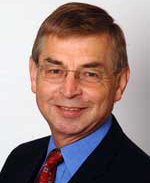 |
Peter Cochrane.
ConceptLabs CA
|
Title: Flying Upside Down - is nothing sacred anymore?
Abstract: Wireless has been with us for longer than the electronic revolution and has enjoyed a far greater stability of operating regime with design rules and wisdoms largely established over an analogue era spanning some 80 years. But all this is changing fast! The arrival of cheap, plentiful, and powerful signal processing and control technology effectively consigns almost all of the wireless history to the waste bin. The ability to dynamically search out free spectrum; assign a suitable modulation method; simultaneously control and steer power emissions in time, frequency and space changes the name of the game in ways that were largely inconceivable 20 years ago. So here are some unexpected realizations for the next 20 years:
• The radio spectrum was limited and precious, it can now be made infinite and free
• Broadcasters were the big guns of old, but they are heading for the third ranks
• Mobile operators may well share the same fate as the broadcasters - only faster!
• Government and regulators will see their involvement in wireless vastly diminished
• The trend towards DIY wireless will accelerate
• There will be millions more wireless devices than people
Future generations will see networks as a cloud rather than a ball of string!
Peter Cochrane was Head of BT Research from 1993 - 99, in 1999 he was appointed Chief Technologist. In November 2000 Peter retired from BT to join his own startup company - ConceptLabs - which he founded with a group out of Apple Computers in 1998 at Campbell CA, in Silicon Valley. A graduate of Trent Polytechnic and Essex University, he was the Collier Chair for The Public Understanding of Science & Technology at The University of Bristol from 1999 to 2000. He is a Fellow of the IEE, IEEE, Royal Academy of Engineering, and a Member of the New York Academy of Sciences. He has published and lectured widely on technology and the implications of IT and was awarded an OBE in 1999 for his contribution to international communications, the IEEE Millennium Medal in 2000 and The City & Guilds Prince Philip Medal in 2001.
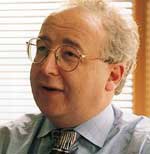 |
David Cleevely
Chairman of the Communications Research Network |
In 1998, he co-founded the internet based antibody company Abcam with Jonathan Milner (CEO), saw it through flotation on AIM in November 2005 and continues as Chairman. In late 2004 he co-founded the 3G pico base station company, 3WayNetworks and joined the Board of Hotxt, a mobile phone text messaging provider, in October 2005. He has been a prime mover behind Cambridge Network and co-founder of Cambridge Wireless and was a Director of Bango until shortly after its flotation on AIM in July 2005. He is also a member of the Ofcom Spectrum Advisory Board, the Expert Panel for the Department of Media, Culture and Sport, the IEE Telecoms Sector Panel and Chairman of the EEDA Digital Partnership. Presently is Chairman of the Communications Research Network, part of the Cambridge MIT Institute, and the founder and former Chairman of telecoms consultancy Analysys (acquired by Datatec International in 2004).
After being sponsored to study Cybernetics at Reading by Post Office Telecommunications, he joined their Long Range Studies Division. A PhD at Cambridge was then followed by the Economist Intelligence Unit in London. Since selling Analysys he has continued to develop his business and academic interests and he currently holds an Industrial Fellowship at the University of Cambridge Computer Laboratory.
|
|



